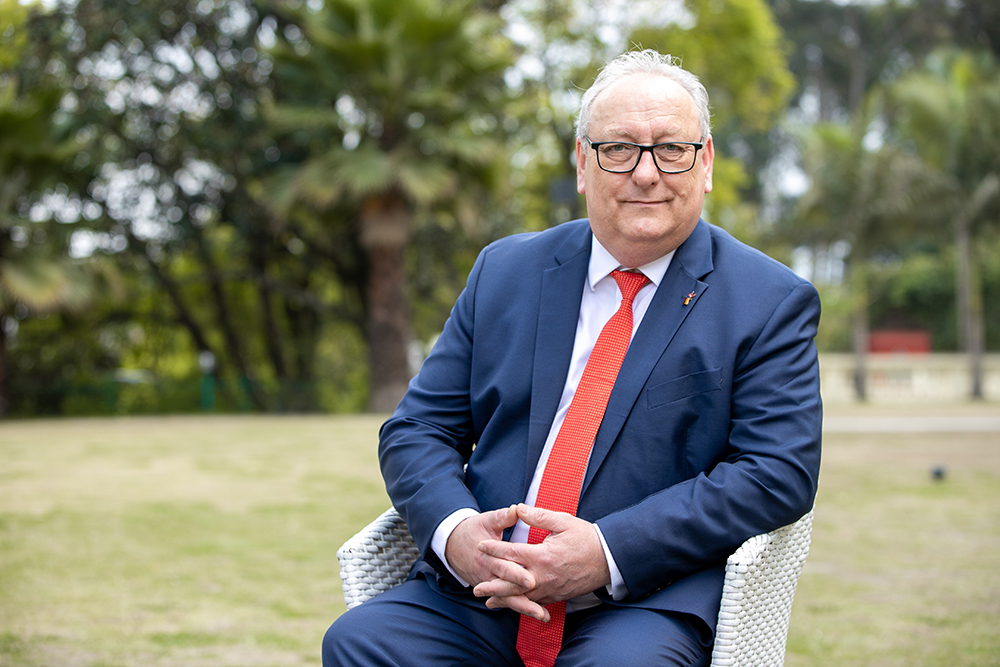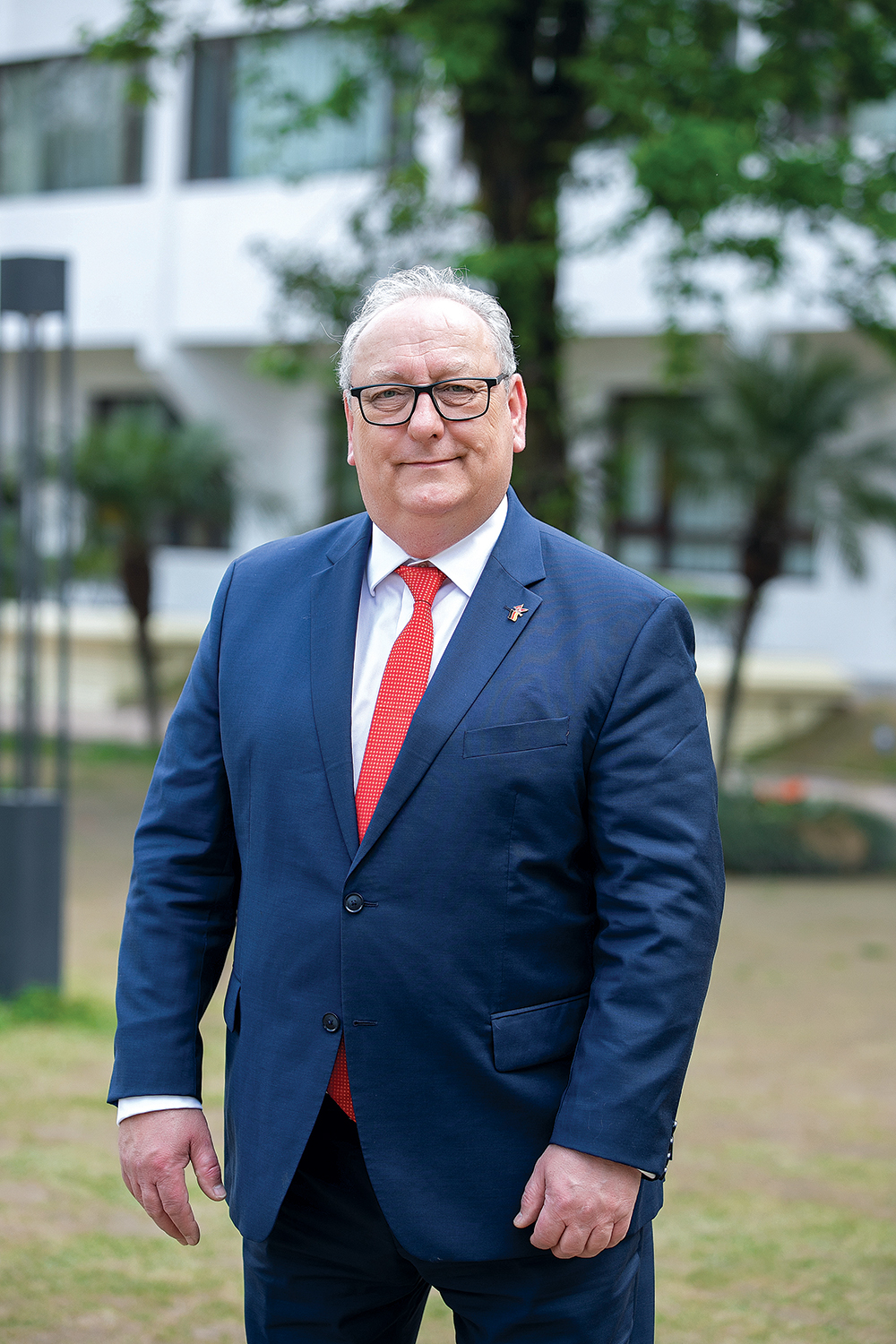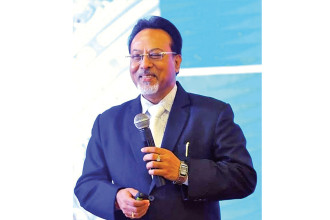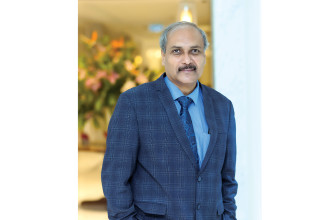
Dr Jurgen Martens
President, Deutsche Gruppe der Liberal International
Dr Jurgen Martens, President of Deutsche Gruppe der Liberal International, was recently in Kathmandu to participate in the conference, Rivers as Lifeline for South Asia, that was organised by the South Asia Office of the Friedrich Naumann Foundation for Freedom (FNF). Dr Martens did his law studies in Freiburg and after giving the second state examination in 1990 was admitted to the bar in Lörrach (Baden-Württemberg). He then worked as a freelance lawyer in Meerane (Saxony) and was also a member of the Saxon state parliament. Dr Martens has also served as Saxon Minister of State for Justice for Europe and also held the honorary position of President of the European Liberal Forum in Brussels. He is a voting member of the working group on harmonisation of German and French commercial and insolvency law; and advisory member of the working group on migration, asylum and integration of the Franco-German Parliamentary Assembly. In this edition of Business 360, we spoke to Dr Martens on his views on aspects of liberalism. Excerpts:What was the main purpose of your visit to Nepal?
I am participating in the conference, Rivers as Lifeline for South Asia, being organised by the South Asia Office of the Friedrich Naumann Foundation for Freedom (FNF). The topic for the conference is a very interesting one and we are trying to address a wide range of issues that are connected to water, from environmental pollution to power plants and hydropower uses and irrigation; not to forget drinking water. There is a whole range of issues that need to be addressed and through this conference we are trying to highlight those issues so that concerned stakeholders are more aware about them and act accordingly. If there is any one issue that we should all be aware of and give importance to then it would be cooperation among countries when it comes to sharing water. Countries in South Asia need to cooperate around this crucial commodity called water because from prehistoric times or we could say since evolution, water has been the source of the oldest conflicts of mankind. This conference, where we have delegates from so many countries, is a chance to show how cooperation between authorities of different states can work for the betterment of the region. And what authorities need to realise is that if they fail, it can be seen by everyone very quickly.Liberalism as a word has many connotations. How do you define it?
I am leading the Deutsche Gruppe der Liberal International which is a small section of the larger organisation called Liberal International. So, I am basically overseeing the German side of the organisation. Liberal International was founded in 1947 in London after World War II to strengthen and foster liberal ideas. If you ask me what liberal ideas mean, then I would say it is about democracy and some other core values like free speech and free media. You also have the representation principle in democracy where people get the opportunity to elect their representatives in government. Liberal ideas are also about the economy. We believe in market economy but you need to understand that market economy does not mean free market economy. We are trying to foster these ideas in Germany and we are also trying to empower human rights worldwide. Liberalism arises from the central term of freedom. Everyone needs a certain degree of freedom for their existence and we see that authoritarian systems of states and governments are neglecting and violating human rights and in the long term this will fail to uplift people. Such regimes are evil as they subjugate others and dominate society. But there is nothing which lasts eternally. At the end of the day there will be people standing up for their freedom and rights and we can see that happening from time to time. We saw it in China in 1989, we saw it in Tibet. We can actually see it in Iran now where people are standing up for their rights and freedom. The core aspect is that people have to be treated at least as human beings. They have to be granted rights like free speech. Liberalism tries to take care of those things because we know the core value for the individual is freedom. It always has been about freedom and will always be. If you don’t have freedom, then your decisions will not be true or let’s say honest or decent.
As the head of the Deutsche Gruppe der Liberal International, what are the core agendas that you are taking forward?
Not only as the head of the Deutsche Gruppe der Liberal International but as an individual too it is about fostering liberal values like I mentioned earlier. And that is the reason why we are engaged in deep cooperation with other liberal organisations within and outside Liberal International. My agenda was and will always be to promote principles of governmental and inter-state cooperation. For instance, in the European level to build closer relationships and work together within the European Union for the basic principles of freedom.When we talk about free, fair and open societies, what do we actually mean?
It is true there are different definitions regarding what constitutes a free, fair and open society. Even for the word ‘freedom’ there are various explanations. Right now, if you get the chance to ask Xi Jinping if the Chinese people are free, he will definitely say they are free but in fact they are not. It is always a question about whether you are being dominated by an overwhelming state which is an authoritarian system; a system that is surveilling you day and night and which does not allow any kind of free speech and that is why we witnessed those demonstrations in Hong Kong when people stood up for their rights. Free press and free media are essential for a free society. Also, a market economy which gives a fair opportunity to all the participants, all stakeholders is essential for a just society. A monopolistic economy has nothing to do with market economy. Therefore, we are very keen to promote these values of entrepreneurship and of individual responsibility. And at the state level it is all about accountability. This means the accountability of the government to explain what they did so that people can make their judgement on whether the government in the country is actually a good one or whether it has failed in government work. For us liberals, it is crucial that we get open, transparent information from the government and there also has to be open discussions in the society. Not everybody will be happy with the result but at least you will have to admit that there was free discussion. In some states, you will notice that democracy is only defined by the word of the majority. If you have a majority in the parliamentary election you are entitled to do anything you want, to even change the constitution with a simple majority or a two-third majority in the parliament which for me is not in line with democratic principles and the rule of law. If you have the majority and can change the law whenever you feel like with others having no right to say anything, then you are at a point where you have to say it is the tyranny of the majority. At the end of the day democracy is always about minorities; it is about the shelter and protection. The protection of minority rights against the majority. Ones with the majority for instance don’t need to go on the streets to demonstrate, it is the minorities that need to. So, it is about their freedom of speech. We have to be aware that a good government will always be focused about minority rights. You have to open that discussion, listen to them, let them be heard. Hence, these are the principles which you have to observe if you want to have an open society.Liberalism emphasises individuals. But when we keep emphasising individuals, will we not hurt collective efforts?
We so often hear about that argument which you just mentioned on whether emphasising on individuals will affect the collective work or not. However, what we have to keep in mind is that there are no contradictions in a few principles. The smallest entity in a society is the individual. So, if individuals get the opportunity to flourish then the society as a whole will flourish. What we are trying to stress is that individuals need to be able to make choices for themselves. In any free society, you will see that individuals are all collaborating on their free will. And when this process happens you will further notice that we will have much better results, sustainable results than others. There will always be things you cannot afford by your own, you always need a societal dimension. But what we see as the founding principle, as the cornerstone is ‘a free individual’.In recent times, there seems to be a rise in the number of people who are speaking against globalisation. What could we owe this to?
Globalisation is something that you cannot define at the national level and that is why we call it globalisation. It is very difficult to define the term globalisation. Even the United States and the European Union have not been able to define the workings of globalisation. It just happens. Therefore, you have to look at certain conditions that you have to preserve. You have to create a level playing field. The economy has to observe certain standards of regulation. There should be no violation of principles pertaining to human rights and worker protection. There should also not be any child labour. Globalisation brings wealth to countries and regions which never have seen any wealth but you have to look at what price. If it is child labour, then the price is not worth it. If you don’t give the younger children the chance to go to school or college to get education then you miss out on the opportunity to move to the next level, the higher level. Education in the society is important. Globalisation is something which is not going to stop now but it has brought a lot of problems for certain countries like Bangladesh for example where we have seen unbearable conditions of work. The economy itself is not able to provide benefits. It depends on the entrepreneurs a lot. For me, an entrepreneur is someone who feels a certain responsibility towards people working for them. And in Bangladesh we have seen entrepreneurs and companies who are absolutely regardless of their workers so that causes a lot of problems. But what I would like to say is globalization brings the chance to develop a society and a nation but you need a government administration that is able and willing to act so that people will obey certain standards of work.What are the core values needed for good governance?
That actually differs from country to country. In Nepal, you have different conditions compared to what you have in Switzerland. Topography wise, both countries are somehow similar but if you look at the society then there are different conditions. And if you look at the economy also there are varying conditions. However, in general terms, good governance means to meet the needs of the people. It is about the government being transparent and accountable. Good governance is to foster an open society which is able to make inventions, which is able to modernise, to grow. These small facts put together resemble good governance. There are also some indicators for good governance. For instance, the other day we were talking about the death rate of new-born children, which is one such indicator. Other indicators could be the percentage of households with drinking water facility or waste water treatment, or it could be the environmental situation. You also have to look at the degree of literacy in the country. So, when we look at these indicators it could point to a degree – some, little or extreme. These indicators can be taken to measure government. All these small things which I just mentioned combine like pixels to give an image of good governance.
Published Date: April 28, 2023, 12:00 am
Post Comment
E-Magazine
RELATED Face 2 Face





